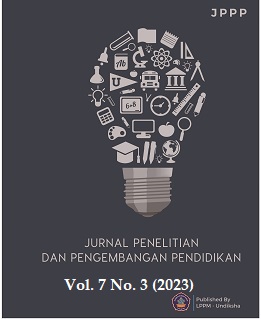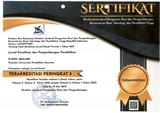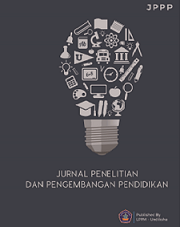Banyumasan Context-based Modul Improves Mathematical Literacy in Data Content of Junior High School Students
DOI:
https://doi.org/10.23887/jppp.v7i3.68233Keywords:
Modul, Mathematical Literacy, Content DataAbstract
Learning mathematics is a type of learning that is quite difficult. However, learning will be easier for students to understand if the material presented uses the students' daily context. Learning modules will help students to understand learning in depth. This research aims to develop a mathematics module based on the Banyumasan context. This development research was adapted from the ADDIE (Analysis, Design, Development, Implementation, Evaluation) development model. Data collection methods were carried out through questionnaires and mathematical literacy tests. Data were analyzed using descriptive analysis and quantitative analysis. The research results concluded that: validation results show that the Banyumasan context-based module meets the feasibility standards and is included in the very good category. The results of developing the Banyumasan context-based module were declared practical to use, with a practicality score included in the good category. The results of the development of the Banyumasan context-based module were declared effective in use with the result t-obs = 8.2140 with a critical area of t > 2.030, which means that the mathematical literacy of students who used the Banyumasan context. The context-based module was better than the mathematical literacy of students before using the Banyumasan context-based module. Banyumasan context.
References
Agustini, K., Santyasa, I. W., & Ratminingsih, N. M. (2019). Analysis of competence on “TPACK”: 21st century teacher professional development. Journal of Physics: Conference Series, 1387(012035), 1–9. https://doi.org/10.1088/1742-6596/1387/1/012035. DOI: https://doi.org/10.1088/1742-6596/1387/1/012035
Asmi, A. R., Dhita Surbakti, A. N., & Hudaidah. (2018). E-Module Development Based Flip Book Maker For Character Building In Pancasila Coursework Sriwijaya University. Jurnal Pendidikan Ilmu Sosial, 27(1), 1–10. https://doi.org/10.17509/jpis.v27i1.9395. DOI: https://doi.org/10.17509/jpis.v27i1.9395
Bano, V. O. (2018). Pengembangan Modul Pelatihan Pengelolaan Penilaian Autentik Guru IPA SMP. Kelola: Jurnal Manajemen Pendidikan, 5(2), 139–151. https://doi.org/10.24246/j.jk.2018.v5.i2.p139-151. DOI: https://doi.org/10.24246/j.jk.2018.v5.i2.p139-151
Baran, E., Correia, A. P., & Thompson, A. (2011). Transforming online teaching practice: Critical analysis of the literature on the roles and competencies of online teachers. Distance Education, 32(3), 421–439. https://doi.org/10.1080/01587919.2011.610293. DOI: https://doi.org/10.1080/01587919.2011.610293
Darmayasa, I. K., Jampel, N., & Simamora, A. (2018). Pengembangan E-Modul Ipa Berorientasi Pendidikan Karakter Di Smp Negeri 1 Singaraja. Jurnal Edutech, 6(1), 53–65. https://doi.org/10.23887/jeu.v6i1.20267.
Hastuti, S., & Lestari, N. A. (2018). Gerakan Literasi Sekolah : Implementasi Tahap Pembiasaan Dan Pengembangan Literasi. BASA TAKA Universitas Balikpapan, 1(2), 29–34. https://doi.org/10.36277/basataka.v1i2.34. DOI: https://doi.org/10.36277/basataka.v1i2.34
Hewi, L., & Shaleh, M. (2020). Refleksi Hasil PISA (The Programme For International Student Assesment): Upaya Perbaikan Bertumpu Pada Pendidikan Anak Usia Dini). Jurnal Golden Age, 4(01), 30–41. https://doi.org/10.29408/jga.v4i01.2018. DOI: https://doi.org/10.29408/jga.v4i01.2018
Jacob, R. J., & Karn, K. S. (2003). Eye tracking in human-computer interaction and usability research: Ready to deliver the promises. In The Mind’s Eye, 573–605. https://doi.org/10.1016/B978-044451020-4/50031-1. DOI: https://doi.org/10.1016/B978-044451020-4/50031-1
Lase., D. (2019). Education and Industrial Revolution 4.0 Delipiter. Jurnal Handayani Pgsd Fip Unimed, 10, 48–62. https://doi.org/10.24114/jh.v10i1.14138. DOI: https://doi.org/10.24114/jh.v10i1.14138
Lestari, S. (2018). The Role of Technology in Education in the Era of Globalization. Edureligion: Journal of Islamic Religious Education, 2(2), 94–100. https://doi.org/10.33650/edureligia.v2i2.459. DOI: https://doi.org/10.33650/edureligia.v2i2.459
Malik, R. S. (2018). Educational Challenges in 21st Century and Sutainable Development. Journal of Sustainable Development Education and Research, 2(1), 9–20. https://doi.org/10.17509/jsder.v2i1.12266. DOI: https://doi.org/10.17509/jsder.v2i1.12266
Maruti, E. S. (2022). Ketahanan Literasi Anak-Anak di Masa Pandemi melalui Aplikasi Let’s Read (Children’s Literacy Resilience in a Pandemic Period Through the Let’s Read Application. Indonesian Language Education and Literature, 7(2), 247. https://doi.org/10.24235/ileal.v7i2.9298. DOI: https://doi.org/10.24235/ileal.v7i2.9298
Masamah, U., Zain, N. K., Salsabila, A., & Maulidani, M. (2023). The development of Islamic integrated geometry student worksheets to facilitate mathematic literacy and religious literacy of junior high school students. Jurnal Pengembangan Pembelajaran Matematika, 5(1), 17–30. https://doi.org/10.14421/jppm.2023.51.17-30.
Megawati, L. A., & Sutarto, H. (2021). Analysis numeracy literacy skills in terms of standardized math problem on a minimum competency assessment. UNNES Journal of Mathematics Education, 10(2), 155–165. https://doi.org/10.15294/ujme.v10i2.49540.
Moonsamy, D., & Govender, I. (2018). Use of blackboard learning management system: An empirical study of staff behavior at a South African university. EURASIA Journal of Mathematics, Science and Technology Education, 14(7), 3069–3082. https://doi.org/10.29333/ejmste/91623. DOI: https://doi.org/10.29333/ejmste/91623
Pilendia, D., & Amalia, S. (2020). The Module of Power Point Optimization Training SDL Based to Improve the Teacher’s Competence in Developing Learning Media. JPI (Jurnal Pendidikan Indonesia), 9(4), 639. https://doi.org/10.23887/jpi-undiksha.v9i4.20921. DOI: https://doi.org/10.23887/jpi-undiksha.v9i4.20921
Prijanto, J. H., & Kock, F. De. (2021). Peran Guru Dalam Upaya Meningkatkan Keaktifan Siswa Dengan Menerapkan Metode Tanya Jawab Pada Pembelajaran Online. Scholaria: Jurnal Pendidikan Dan Kebudayaan, 11(3), 238–251. https://ejournal.uksw.edu/scholaria/article/view/4318.
Rustandi, A., & Rismayanti. (2021). Penerapan Model ADDIE dalam Pengembangan Media Pembelajaran di SMPN 22 Kota Samarinda. Jurnal Fasilkom, 11(2), 57–60. https://doi.org/10.37859/jf.v11i2.2546. DOI: https://doi.org/10.37859/jf.v11i2.2546
Saefurohman, S., Maryanti, R., Azizah, N. N., Al Husaeni, D. F., Wulandary, V., & Irawan, A. R. (2021). Efforts to increasing numeracy literacy of Elementary School Students through Quiziz learning media. ASEAN Journal of Science and Engineering Education, 1(3), 11–18. https://doi.org/10.17509/ajsee.v3i1.38570.
Shelton, K., & Saltsman, G. (2006). Using the Addie Model for Teaching Online’. International Journal of Information and Communication Technology Education (IJICTE, 2(3), 14–26. https://doi.org/10.4018/jicte.2006070102. DOI: https://doi.org/10.4018/jicte.2006070102
Siregar, E., Sutiarso, S., & Yusuf, Z. (2021). Analysis of Students’ Mathematical Literacy Ability in Algebraic Concepts Based on Trends in International Mathematics and Science Study (TIMSS) Problems. Technium Social Sciences Journal, 21, 381–392. https://doi.org/10.47577/tssj.v21i1.3904. DOI: https://doi.org/10.47577/tssj.v21i1.3904
Sopacua, J., Fadli, M. R., & Rochmat, S. (2020). The History Learning Module Integrated Character Values. Journal of Education and Learning (EduLearn), 14(3), 463–472. https://doi.org/https://doi.org/10.11591/edulearn.v14i3.16139. DOI: https://doi.org/10.11591/edulearn.v14i3.16139
Sumirattana, S., Makanong, A., & Thipkong, S. (2017). Using realistic mathematics education and the DAPIC problem-solving process to enhance secondary school students’ mathematical literacy. Kasetsart Journal of Social Sciences, 38(3), 307–315. https://doi.org/10.1016/j.kjss.2016.06.001. DOI: https://doi.org/10.1016/j.kjss.2016.06.001
Susanta, A., Sumardi, H., & Zulkardi, Z. (2022). Development of e-module using Bengkulu contexts to improve literacy skills of junior high school students. Jurnal Pendidikan Matematika, 16(2), 171–186. https://doi.org/10.22342/jpm.16.2.17698.171-186. DOI: https://doi.org/10.22342/jpm.16.2.17698.171-186
Syaifuddin, M. (2022). Minimum Competency Assessment to Measure Mathematical Literacy of Junior High School Students. Journal of Education Research and Evaluation, 6(2), 316–326. https://doi.org/10.23887/jere.v6i2.46263. DOI: https://doi.org/10.23887/jere.v6i2.46263
Tschand, M., Mayer, B., & Sorkoa, S. R. (2020). An interdisciplinary digital learning and research factory: The Smart Production Lab. Procedia Manufacturing, 45, 491–496. https://doi.org/10.1016/j.promfg.2020.04.061. DOI: https://doi.org/10.1016/j.promfg.2020.04.061
Turiman, P., Omar, J., Daud, A. M., & Osman, K. (2012). Fostering the 21st Century Skills through Scientific Literacy and Science Process Skills. Procedia - Social and Behavioral Sciences, 59, 110–116. https://doi.org/10.1016/j.sbspro.2012.09.253. DOI: https://doi.org/10.1016/j.sbspro.2012.09.253
Wagiran, Pardjono, Suyanto, W., Sofyan, H., Soenarto, S., & Yudantoko, A. (2019). Competencies of future vocational teachers: Perspective of in-service teachers and educational experts [Kompetensi guru kejuruan masa depan: Perspektif guru dan ahli pendidikan]. Cakrawala Pendidikan, 38(2), 388–400. https://doi.org/10.21831/cp.v38i2.25393. DOI: https://doi.org/10.21831/cp.v38i2.25393
Xu, L. (2017). Developing multimedia supplementary materials to support learning beginning level Chinese characters. CALL in a Climate of Change: Adapting to Turbulent Global Conditions – Short Papers from EUROCALL 2017, 2017(2017), 333–338. https://doi.org/10.14705/rpnet.2017.eurocall2017.736. DOI: https://doi.org/10.14705/rpnet.2017.eurocall2017.736
Yuliana, Y., Usodo, B., & Riyadi, R. (2023). The New Way Improve Mathematical Literacy in Elementary School: Ethnomathematics Module with Realistic Mathematics Education. AL-ISHLAH: Jurnal Pendidikan, 15(1), 33–44. https://doi.org/10.35445/alishlah.v15i1.2591. DOI: https://doi.org/10.35445/alishlah.v15i1.2591
Downloads
Published
How to Cite
Issue
Section
License
Copyright (c) 2023 yusrina qotrun

This work is licensed under a Creative Commons Attribution-ShareAlike 4.0 International License.
Authors who publish with the Jurnal Penelitian dan Pengembangan Pendidikan agree to the following terms:
- Authors retain copyright and grant the journal the right of first publication with the work simultaneously licensed under a Creative Commons Attribution License (CC BY-SA 4.0) that allows others to share the work with an acknowledgment of the work's authorship and initial publication in this journal.
- Authors are able to enter into separate, additional contractual arrangements for the non-exclusive distribution of the journal's published version of the work (e.g., post it to an institutional repository or publish it in a book), with an acknowledgment of its initial publication in this journal.
- Authors are permitted and encouraged to post their work online (e.g., in institutional repositories or on their website) prior to and during the submission process, as it can lead to productive exchanges, as well as earlier and greater citation of published work. (See The Effect of Open Access)








